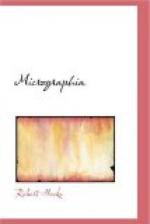This Conjecture of mine I shall indeavour to make out by explaining each particular Assertion with analogous Experiments: The Assertions are there.
First, That the parts of the
Glass, whilst in a fluid Consistence and
hot, are more rarified, or
take up more room, then when hard and cold.
Secondly, That the parts of the drop do suffer a twofold contraction.
Thirdly, That the dropping
or quenching the glowing metal in the Water
makes it of a hard, springing,
and rarified texture.
Fourthly, That there is a
flexion or force remaining upon the parts of
the Glass thus quenched, from
which they indeavour to extricate
themselves.
Fifthly, That the Fabrick
of the drop, that is able to hinder the parts
from extricating themselves,
is analogus to that of an Arch.
Sixthly, That the sudden flying
asunder of the parts proceeds from
their springiness.
Seventhly, That a gradual
heating and cooling does anneal or reduce the
parts of Glass to a texture
that is more loose, and easilier to be
broken, but not so brittle.
That the first of these is true may be gathered from this, That Heat is a property of a body arising from the motion or agitation of its parts; and therefore whatever body is thereby toucht must necessarily receive some part of that motion, whereby its parts will be shaken and agitated, and so by degrees free and extricate themselves from one another, and each part so moved does by that motion exert a conatus of protruding and displacing all the adjacent Particles. Thus Air included in a vessel, by being heated will burst it to pieces. Thus have I broke a Bladder held over the fire in my hand, with such a violence and noise, that it almost made me deaf for the present, and much surpassed the noise of a Musket: The like have I done by throwing into the fire small glass Bubbles hermetically sealed, with a little drop of Water included in them. Thus Water also, or any other Liquor, included in a convenient vessel, by being warmed, manifestly expands it self with a very great violence, so as to break the strongest vessel, if when heated it be narrowly imprisoned in it. This is very manifest by the Sealed Thermometers, which I have, by several tryals, at last brought to a great certainty and tenderness: for I have made some with stems above four foot long, in which the expanding Liquor would so far vary, as to be very neer the very top in the heat of Summer, and prety neer the bottom at the coldest time of the Winter. The Stems I use for them are very thick, straight, and even Pipes of Glass, with a very small perforation, and both the head and body I have made on purpose at the Glass-house, of the same metal whereof the Pipes are drawn: these I can easily in the flame of a Lamp, urged with the blast of a pair




